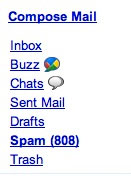Note: Since publishing this article, Chengdu Living has established presence on Google Buzz. Check us out if you’re a Gmail user like us.
Twitter and Facebook compete for the ever-expanding pool of social network users around the world, but they’re both blocked and inactive in China, the world’s most prolific internet market. Great news for Chinese social networking site Tudou, but it’s a real bummer for foreigners interacting with friends and family overseas – or Chinese who interact with people outside of their national borders. Chinese have long been populating their own blogs and social networks in incredible numbers, but the door is wide open for Google to strike.
Assuming it doesn’t get blocked, that is.
What is Google Buzz?
Buzz was announced two days ago on Google’s official blog and Todd Jackson, Buzz’s product manager, offered this description:
Google Buzz is a new way to start conversations about the things you find interesting. It’s built right into Gmail, so you don’t have to peck out an entirely new set of friends from scratch — it just works. If you think about it, there’s always been a big social network underlying Gmail. Buzz brings this network to the surface by automatically setting you up to follow the people you email and chat with the most. We focused on building an easy-to-use sharing experience that richly integrates photos, videos and links, and makes it easy to share publicly or privately (so you don’t have to use different tools to share with different audiences). Plus, Buzz integrates tightly with your existing Gmail inbox, so you’re sure to see the stuff that matters most as it happens in real time.

Since Buzz is built right into Gmail, it’s already sitting on a user base numbering in the hundreds of millions. This is an advantage that Facebook and Twitter never had, and it means that your friends are probably already on here. The convenience of having it built into a product you already use is paramount, because a lot of people are overwhelmed with all the other options.
Before Buzz is added to your Gmail account it makes a quick introduction and adds a link just below your inbox – from there, sending and receiving text, photos, video, and links between friends and family is a click away. It’s a cinche to use and within hours of it being operational I witnessed a huge number of friends start adopting it immediately.
Penetrating the Great Firewall
Exactly a month has passed since Google aired it’s differences with China’s internet policy, and tensions remain high. Other than China defending it’s policy of censorship as expected, there haven’t been many developments in the dispute, as both sides have remained unusually quiet. No one can be sure how Google’s announcement of Buzz fits into the larger picture of Google’s place in China, but an announcement this big surely must being having a large impact considering the fate that befell Facebook and Twitter. Facebook and Twitter offered similar services and the content of their networks got them black listed from China – but Buzz might succeed where they didn’t.
Considering the likeness of Buzz to the dominant social networks, it’s hard to imagine a situation where Buzz is completely safe from being black-listed. At their core, all of these networks are for sharing what you enjoy with people you care about – it’s never been the networks that have been the problem, but the information shared on them. The internet has been knocking down communication obstacles for people around the world at a furious pace over the last ten years, and Google Buzz could be the next evolution.
No one but Gmail could pull this off, because they’re banking on their massive base of users positioned in every country around the world. Unlike Facebook or Twitter, China has already been bitten by the Google bug, so blocking it from here on out isn’t as logistically feasible. Of the millions of Google users in China, they tend to be better educated and higher earners than those who use domestic search competitors like Baidu. Since Buzz and Gmail are intertwined and operate in conjunction with each other, blocking the pair becomes a major proposition unless you decide to block Google entirely. Even with what’s happened, that seems like an unlikely scenario.

My hope is that Buzz is adopted by the larger worldwide community and paves the way for a social network that succeeds in connecting the world. I use a VPN to access Facebook and other blocked sites, but but being able to send and receive status updates with friends both in and outside of China is something I haven’t been able to do in years. My fingers are crossed that Buzz succeeds where it’s previous social network efforts like Orkut have failed, by tapping into the hundreds of millions who use Gmail every day.
If you’re a Gmail user, Buzz will automatically be added for you. If you aren’t, sign up and enjoy the best free webmail around. Buzz also works on iPhones and phones running on the Android operating system.
If you’re a Gmail user or you’ve used Buzz, what do you think?
I’ve enjoyed Buzz so far, very convenient and a bit like twitter but in my inbox so no need to faff around with the VPN. As far as it simplifies mass communication among a network, I am a bit worried about it getting blocked though, despite how huge Google is.
But it’s not like Twitter, right? Not totally public (you don’t necessarily have a page with your ‘buzzes’ on it) and no way to read a page of stranger’s ‘Buzzes’ on a #tag like Twitter(so you can only read buzzes from people you follow, unless they’ve made their buzzes public?). As I understand though, Google want to incorporate the results in their search results? Seems a little like they just want to mine information from users…
Also I’m not sure how well privacy is safeguarded, seeing as it’s so linked to your email address… see this guys post for more on that, including implications for people and surveillance in China
http://rudenoon.com/absalletc/archives/2227
Oh and Charlie – add me on buzz (I assume you can see my email?) I want more people to follow!
Hi Fran!
Buzz is great because Twitter is boring and Facebook is cluttered with stuff I’m not interested in. Not all of my friends are on Gmail, but most are.
Buzz is public unless you indicate your messages as private. Public buzz..es all show up on your Google profile page and are indexed in Google. Be mindful and use common sense when posting things publicly and I don’t think it’s a big issue. I read the post you mentioned and it sounds like Google, with it’s vast network of personal data, isn’t for people like that – who don’t want any information about them public.
It doesn’t seem likely that Buzz will or can be blocked without blocking Gmail, too. Blocking Gmail would be difficult because there would be a huge backlash on the internet from the millions of affected upper class young people. The same demographic that shut down last years “Green Dam” software proposition.
I will add you on Buzz! My email is [email protected]
Looks like the privacy concerns are getting a lot of attention right now: http://tinyurl.com/y98bxee
There are many privacy concerns. I delete myself from buzz and won’t use it. I don’t want my email address being sent it out people I don’t know.
Have you read this take on it? Pretty damn scary. http://tiny.cc/uK4Kq
@SZ Reader, I have read that, it was linked to by a commenter above you. Very interesting piece that makes good points which didn’t occur to me when I first started using Buzz. If you’re worried about
They definitely made some inaccurate assumptions about privacy but they’re scrambling to fix everything. Every day there’s more news about how Google is adjusting how Buzz works to allay privacy concerns! I’m confident they’ll get it together soon and like Gmail, this will be something that builds a following over years.
i wonder how it chooses which of my blogposts to make visible … seems like everyone is taking to it very quickly. This is only a feeling, but Twitter is for bored people chasing famous people; FB is for college buddies who want to show each other they all growed up and Buzz is for revolutions.
really. something about the way it looks, all that text,brings to mind an image of people exhorting each other, decisions made … seems different than the others … any thoughts?
Google Wave didn’t take off, so this is the new try. It could work.
I like twitter for pure versatility. Connection to SMS is great for hearing from folks all over the globe – getting a text from a few buddies tweeting.